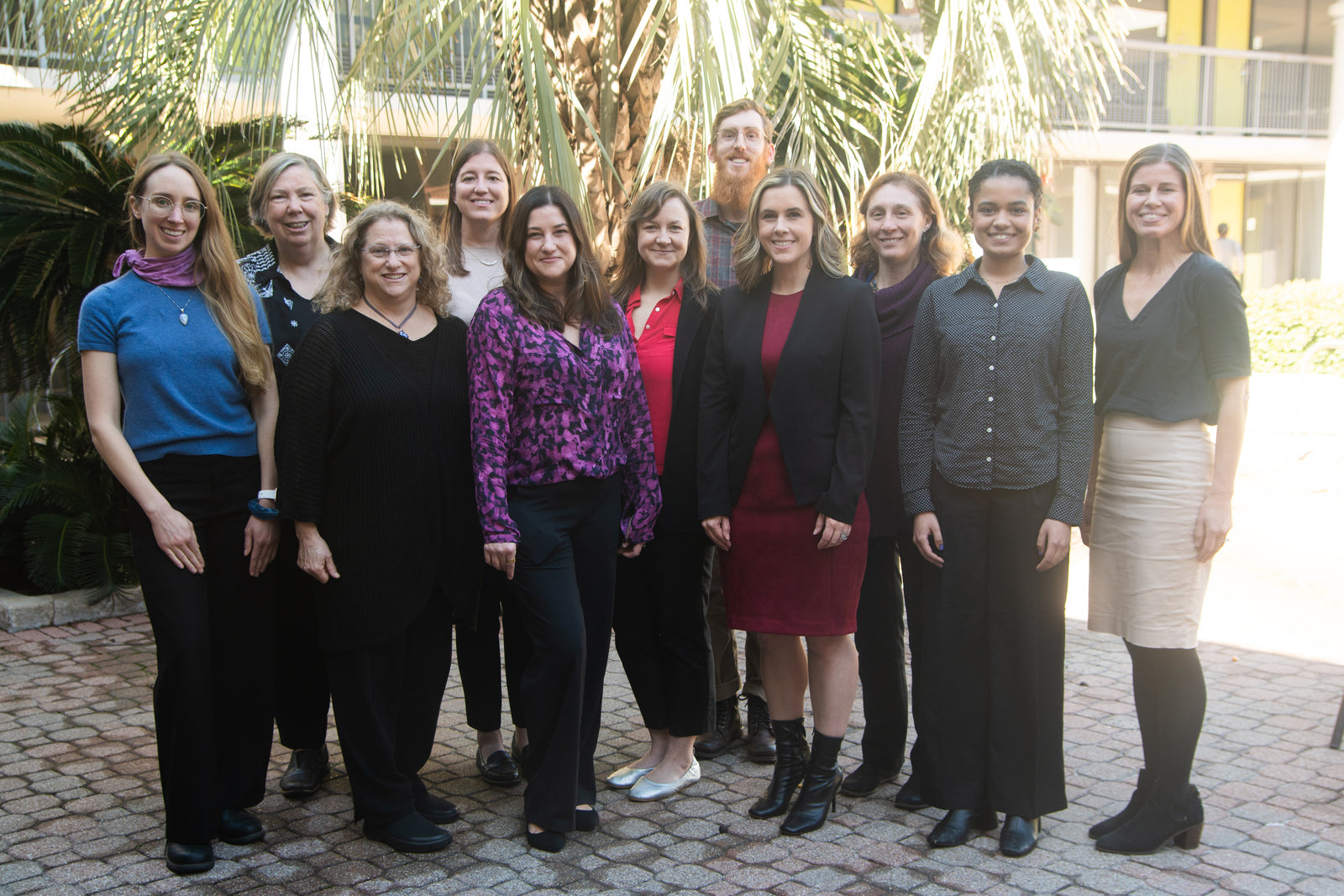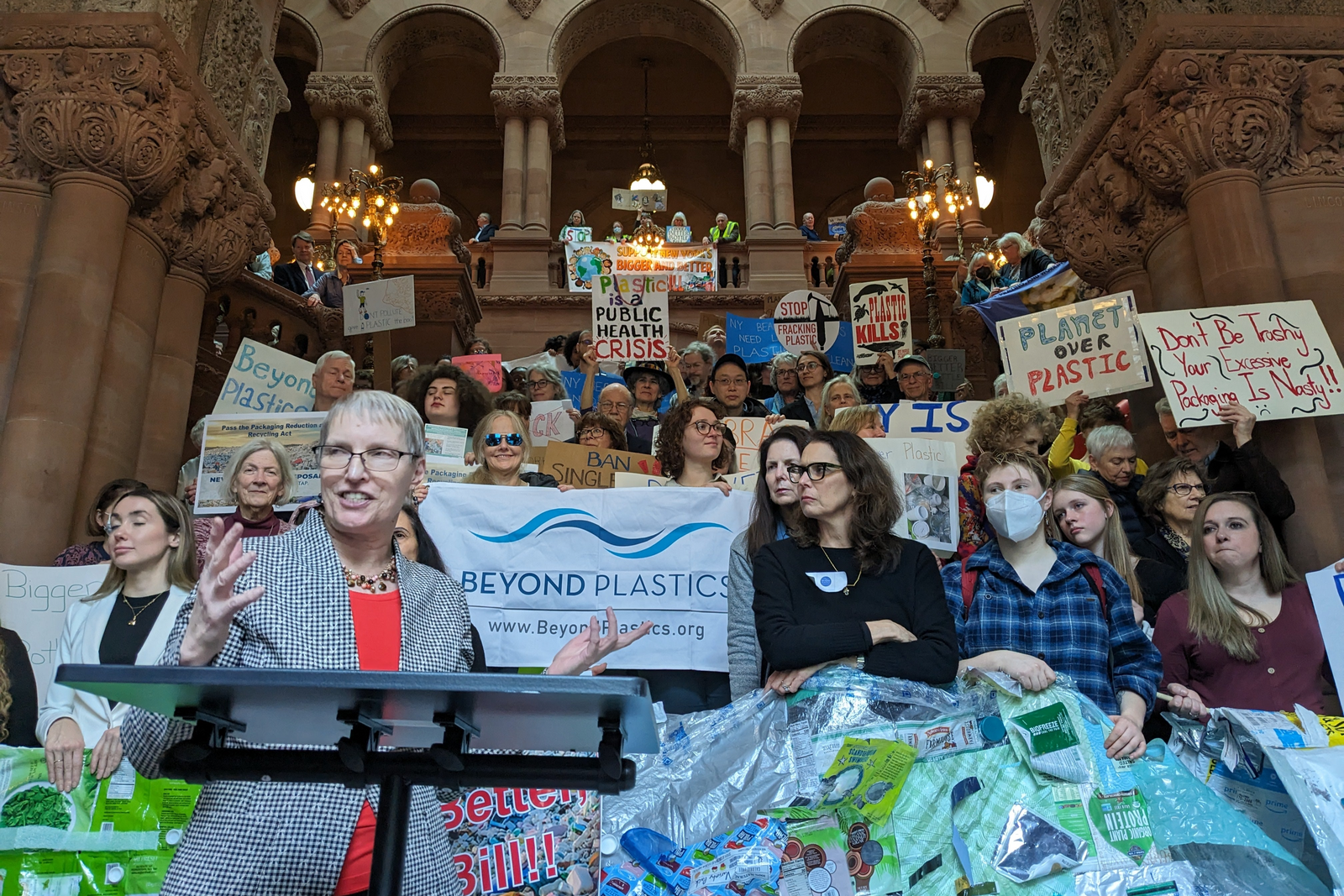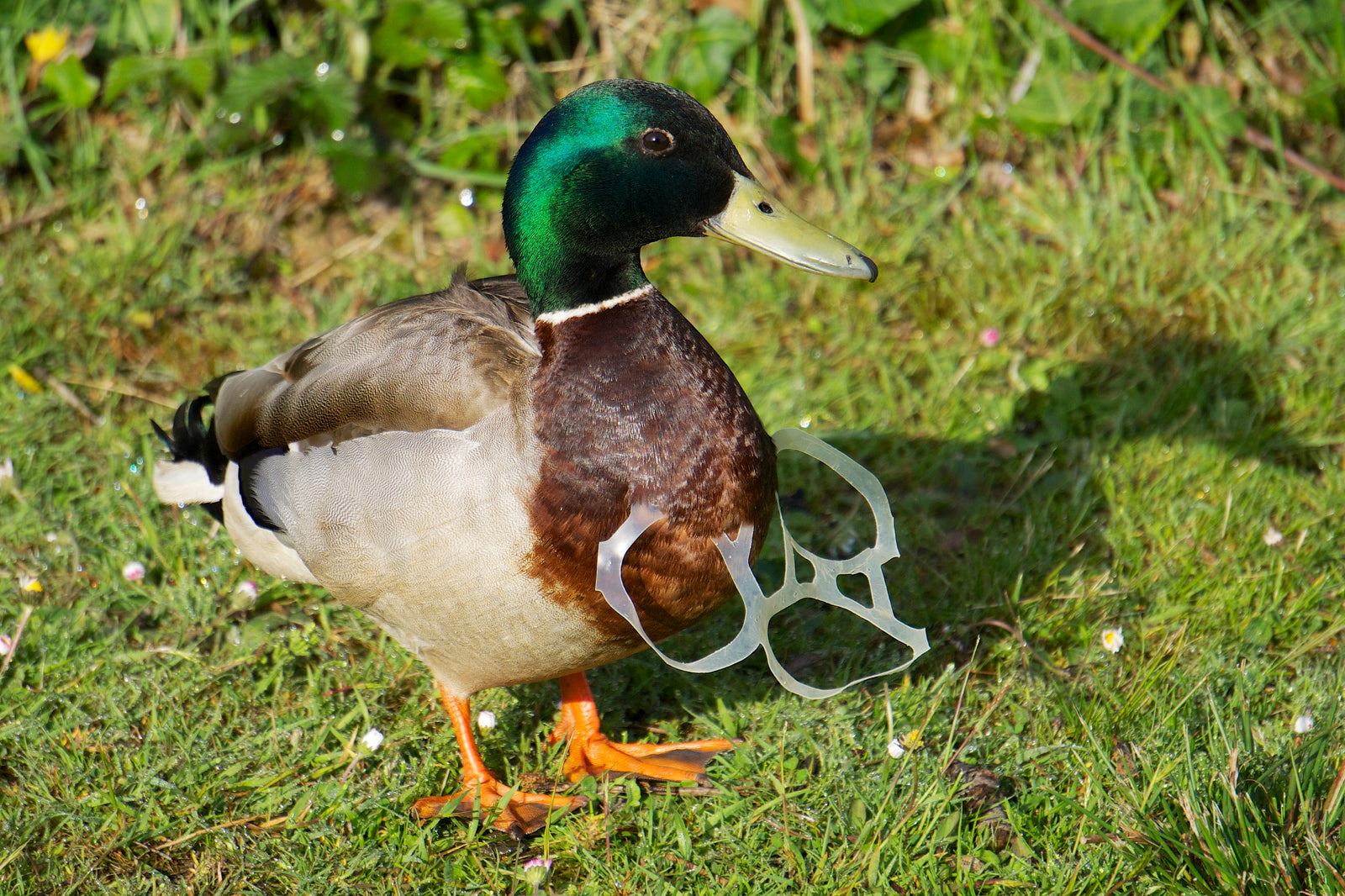August 22nd, 2024 | by Keaton Smith
Since joining Bivo, I’ve had the opportunity to meet so many folks doing great work to tackle the issue of plastic today. I have learned from people working hard to clean up plastic pollution, researching microplastics and their effects, and advocate for legislation that gets us closer to a plastic free future.
Most recently, I interviewed Melissa Valliant, Communications Director at Beyond Plastics to better understand the scope of the plastics problem today and what we can do to help.
Beyond Plastics is a non profit organization founded in 2019 at Bennington College in Vermont. Its goal is to end plastic pollution everywhere through education, advocacy, grassroots organizing, and policy change on the local, state, and national level.
Since joining Bivo, I’ve had the opportunity to meet so many folks doing great work to tackle the issue of plastic today. I have learned from people working hard to clean up plastic pollution, researching microplastics and their effects, and advocate for legislation that gets us closer to a plastic free future.
Most recently, I interviewed Melissa Valliant, Communications Director at Beyond Plastics to better understand the scope of the plastics problem today and what we can do to help.
Beyond Plastics is a non profit organization founded in 2019 at Bennington College in Vermont. Its goal is to end plastic pollution everywhere through education, advocacy, grassroots organizing, and policy change on the local, state, and national level.
Melissa shared so much great information with me, so I put it all together in an article for all of you! Thanks to Melissa and the Beyond Plastics team for pulling back the curtain on the state of plastics today.
Plastic is a persistent pollutant as well as a health hazard and it has many negative effects on our world. Its impacts can be separated into four categories. 1) Environmental impact,2) Human health impact,3) Environmental justice impacts, and4) Climate impact.
Melissa shared so much great information with me, so I put it all together in an article for all of you! Thanks to Melissa and the Beyond Plastics team for pulling back the curtain on the state of plastics today.
Plastic is a persistent pollutant as well as a health hazard and it has many negative effects on our world. Its impacts can be separated into four categories. 1) Environmental impact,2) Human health impact,3) Environmental justice impacts, and4) Climate impact.
Melissa and the team at Beyond Plastics, from Melissa Valliant.
Melissa and the team at Beyond Plastics, from Melissa Valliant.
Today, plastic is everywhere. It's even been found in the most remote places in the world such as the Arctic and the Mariana Trench.
There is an estimated 33 billion pounds of plastic entering the ocean every year. And it’s hard for plastic clean up efforts alone to solve the problem, because so much of our plastic problem in the environment right now is microplastics. These microplastics usually pose a great risk to the environment, often ending up being ingested by marine life and ending up in the food chain.
People are becoming increasingly aware that plastics are not just an environmental problem. It impacts humans, too. We've known plastics are an environmental problem for nearly half a century. But there is a lot of science that's coming out now that is making it very clear that plastic is also a human issue.
In the past 5 years, studies have been coming out that have shown microplastics in the human placenta, in our feces, in our blood, in the brain and, most recently, they found microplastics in the carotid artery. That study also found that the people with microplastics in their carotid artery were more likely to have other cardiovascular conditions later in life.
Not only are microplastics in our bodies, but plastic itself contains thousands of different chemicals, many of which are proven to be toxic. And many more have not even been studied for their toxicity or safety with humans.
The toxic chemicals in plastics are associated with endocrine disruption or hormone disruption. This can result in scrambled appetite cues and metabolism, leading to obesity, diabetes, high blood pressure, and heart disease. These chemicals are also associated with fertility risks and neurological damage.
Plastic is an environmental justice issue from start to finish: from the production, all the way to the waste management after consumers are done with products. Plastic production facilities are often located in low income communities and communities of color, and that is entirely because the companies know that the residents there have fewer resources and power to fight back.
Unfortunately, this means that these communities are also burdened with the health impacts of the air pollution and toxic waste that comes out of these facilities. Port Arthur, Texas and “Cancer Alley” in New Orleans are two very notable areas where this injustice is happening.
Incineration of plastics is another toxic waste management pseudo-solution. Those facilities are also set up in primarily communities of color and low income communities where the residents suffer impacts there too.
Many people don't realize that the plastic pollution crisis is directly contributing to the climate crisis, because plastic is made of fossil fuels. So, it is impacting climate and releasing greenhouse gasses throughout its entire life cycle.
While most people know that the aviation sector is terrible when it comes to greenhouse gas emission, many don’t know that the plastic industry emits far more greenhouse gasses than the aviation sector. In fact, if plastic were its own country, it would be the fifth largest emitter of greenhouse gasses in the entire world.
Today, plastic is everywhere. It's even been found in the most remote places in the world such as the Arctic and the Mariana Trench.
There is an estimated 33 billion pounds of plastic entering the ocean every year. And it’s hard for plastic clean up efforts alone to solve the problem, because so much of our plastic problem in the environment right now is microplastics. These microplastics usually pose a great risk to the environment, often ending up being ingested by marine life and ending up in the food chain.
People are becoming increasingly aware that plastics are not just an environmental problem. It impacts humans, too. We've known plastics are an environmental problem for nearly half a century. But there is a lot of science that's coming out now that is making it very clear that plastic is also a human issue.
In the past 5 years, studies have been coming out that have shown microplastics in the human placenta, in our feces, in our blood, in the brain and, most recently, they found microplastics in the carotid artery. That study also found that the people with microplastics in their carotid artery were more likely to have other cardiovascular conditions later in life.
Not only are microplastics in our bodies, but plastic itself contains thousands of different chemicals, many of which are proven to be toxic. And many more have not even been studied for their toxicity or safety with humans.
The toxic chemicals in plastics are associated with endocrine disruption or hormone disruption. This can result in scrambled appetite cues and metabolism, leading to obesity, diabetes, high blood pressure, and heart disease. These chemicals are also associated with fertility risks and neurological damage.
Plastic is an environmental justice issue from start to finish: from the production, all the way to the waste management after consumers are done with products. Plastic production facilities are often located in low income communities and communities of color, and that is entirely because the companies know that the residents there have fewer resources and power to fight back.
Unfortunately, this means that these communities are also burdened with the health impacts of the air pollution and toxic waste that comes out of these facilities. Port Arthur, Texas and “Cancer Alley” in New Orleans are two very notable areas where this injustice is happening.
Incineration of plastics is another toxic waste management pseudo-solution. Those facilities are also set up in primarily communities of color and low income communities where the residents suffer impacts there too.
Many people don't realize that the plastic pollution crisis is directly contributing to the climate crisis, because plastic is made of fossil fuels. So, it is impacting climate and releasing greenhouse gasses throughout its entire life cycle.
While most people know that the aviation sector is terrible when it comes to greenhouse gas emission, many don’t know that the plastic industry emits far more greenhouse gasses than the aviation sector. In fact, if plastic were its own country, it would be the fifth largest emitter of greenhouse gasses in the entire world.
Plastic cups littering the ground during the Berlin Marathon, from Dirk Ingo Franke.
Plastic cups littering the ground during the Berlin Marathon, from Dirk Ingo Franke.
While it is quite difficult to cut out plastic entirely, consumers and individuals should do whatever they can to reduce their use of plastic. Every little bit does count.
It’s important to realize that this is not a problem that will be solved by consumers alone.
This can all become much more convenient for consumers if policymakers start incentivizing consumers and businesses to shift away from single use plastic and other disposable materials to refillable and reusable options. We need companies to stop using and producing so much plastic. And we need policymakers to hold them accountable.
One of the best ways to get involved is if your community does not have a plastic bag ban or, maybe your state doesn't have a polystyrene ban yet, you can reach out to Beyond Plastics, as they have tools to help people organize locally.
Another effective way to help is by using your ballot. Vote for government officials and lawmakers that care about the environment, prioritize public health and hold big oil and big plastic accountable. New York state nearly passed what would have been the most sweeping plastic reduction bill in the world; Beyond Plastics will be pushing for this bill again next year. Additionally, Beyond Plastics is supporting the Break Free from Plastic Pollution Act and hopes this will be reintroduced.
Unfortunately it's taken a lot of time for the environmental impact of plastic to even resonate with society, much less now the health impacts. That is because the plastics industry and the petrochemical industry are working hard to tamp those concerns down and promote the benefits of plastic at all times, as well as the pseudo-solution of plastic recycling, which we now know is not going to fix this problem. Check out this article on plastic recycling by Beyond Plastics
Big companies headquartered here in the United States have done a very effective job of (wrongly) alleviating society's concerns, which is why groups like Beyond Plastics are committed to educating as much as possible.
While it is quite difficult to cut out plastic entirely, consumers and individuals should do whatever they can to reduce their use of plastic. Every little bit does count.
It’s important to realize that this is not a problem that will be solved by consumers alone.
This can all become much more convenient for consumers if policymakers start incentivizing consumers and businesses to shift away from single use plastic and other disposable materials to refillable and reusable options. We need companies to stop using and producing so much plastic. And we need policymakers to hold them accountable.
One of the best ways to get involved is if your community does not have a plastic bag ban or, maybe your state doesn't have a polystyrene ban yet, you can reach out to Beyond Plastics, as they have tools to help people organize locally.
Another effective way to help is by using your ballot. Vote for government officials and lawmakers that care about the environment, prioritize public health and hold big oil and big plastic accountable. New York state nearly passed what would have been the most sweeping plastic reduction bill in the world; Beyond Plastics will be pushing for this bill again next year. Additionally, Beyond Plastics is supporting the Break Free from Plastic Pollution Act and hopes this will be reintroduced.
Unfortunately it's taken a lot of time for the environmental impact of plastic to even resonate with society, much less now the health impacts. That is because the plastics industry and the petrochemical industry are working hard to tamp those concerns down and promote the benefits of plastic at all times, as well as the pseudo-solution of plastic recycling, which we now know is not going to fix this problem. Check out this article on plastic recycling by Beyond Plastics
Big companies headquartered here in the United States have done a very effective job of (wrongly) alleviating society's concerns, which is why groups like Beyond Plastics are committed to educating as much as possible.
Beyond Plastics lobbying for changes in plastic policy, from Melissa Valliant.
A duck with a plastic 6-pack ring around its neck, from Ian Kirk.
Beyond Plastics lobbying for changes in plastic policy, from Melissa Valliant.
A duck with a plastic 6-pack ring around its neck, from Ian Kirk.
Melissa Valliant is the Communications Director for Beyond Plastics. She is a dedicated communications professional and accomplished writer who believes in the power of words to effect change. She grew up on the Eastern Shore of Maryland and graduated from Syracuse University with a plan to pursue magazine journalism. Somewhere along the way, she became hooked on environmental conservation and discovered a love for leveraging her communications abilities to make the world a better place. Melissa had her first letter to the editor published in a kids' science magazine at the age of 11 and has since been published in the New York Times, Washington Post, Wall Street Journal, and USA Today, among others. Prior to her role at Beyond Plastics, she managed communications for Oceana's plastics campaign and worked for the National Aquarium in Baltimore.
Thanks for taking the time to speak with us, Melissa!
Melissa Valliant is the Communications Director for Beyond Plastics. She is a dedicated communications professional and accomplished writer who believes in the power of words to effect change. She grew up on the Eastern Shore of Maryland and graduated from Syracuse University with a plan to pursue magazine journalism. Somewhere along the way, she became hooked on environmental conservation and discovered a love for leveraging her communications abilities to make the world a better place. Melissa had her first letter to the editor published in a kids' science magazine at the age of 11 and has since been published in the New York Times, Washington Post, Wall Street Journal, and USA Today, among others. Prior to her role at Beyond Plastics, she managed communications for Oceana's plastics campaign and worked for the National Aquarium in Baltimore.
Thanks for taking the time to speak with us, Melissa!
In honor of Bivo's 5th birthday this past week, we've opened up the discussion to all of you on our Instagram, you all had great questions! We picked some of our favorites to ask Robby and Carina. Some questions about business, some questions about life, cheers to five years :)
As the head of customer service I often get emails from people who are buying the bottles for others. I have loved hearing from our fantastic customers on why they love these bottles not just for themselves but for the special cyclists in their lives. I wanted to take the opportunity to share some of the spectacular messages we've received over the past year. These reviews and emails seriously made us smile!
This week, we are highlighting a bike shop we visited recently in Pennsylvania, Hush Money Bikes! We feel that they exhibit the fuel more fun attitude that Bivo believes in so adamantly. The co-owner Nathan shares their story!


